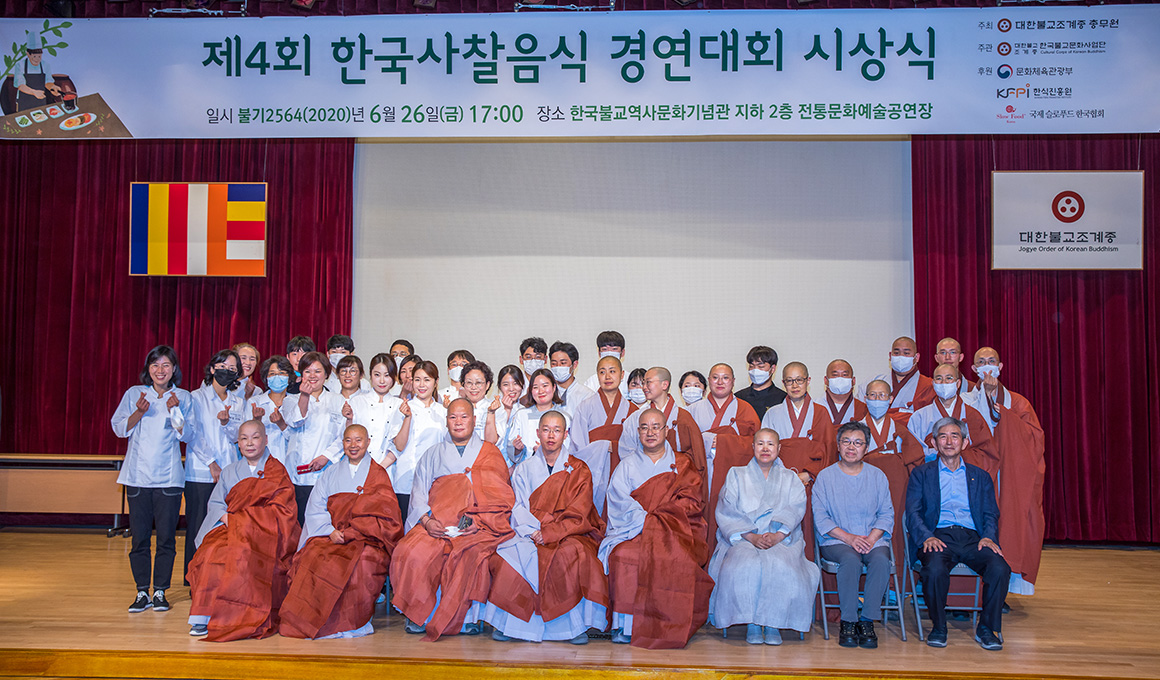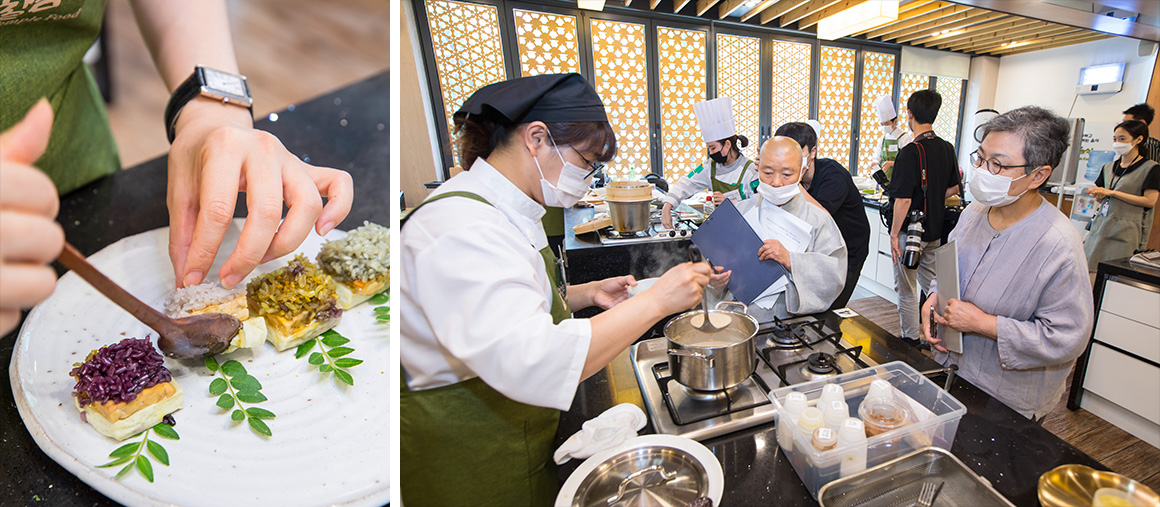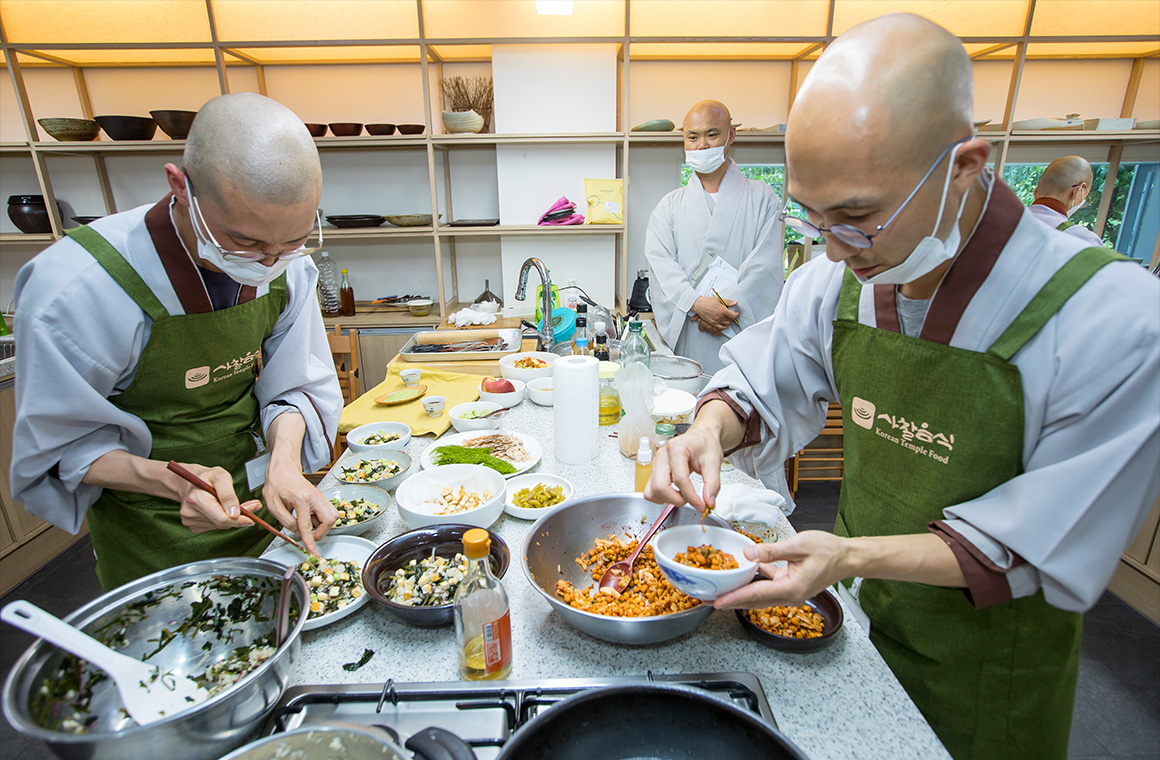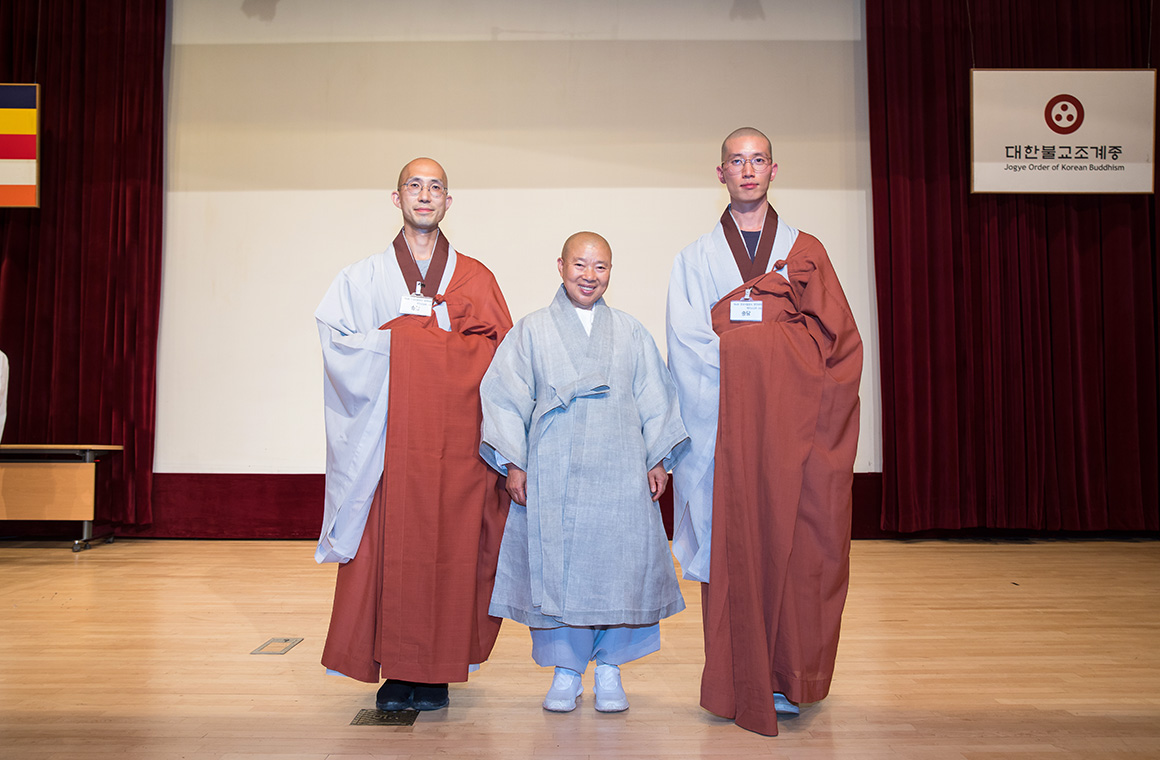The 4th Korean Temple Food Competition Successfully Completed
The Flavor of Temples, the Flavor of Cultivation! A Process as Good as the End Product

Korean temple food is drawing global attention as health food for the following reasons: its refreshing energy and use of seasonal and natural ingredients; it also doesn’t use meat, fish, the five pungent vegetables prohibited by Buddhism or artificial flavor enhancers. Temple food was the theme of the 4th Korean Temple Food Competition held on June 26 this year (2564 Buddhist Era). Organized by the Cultural Corps of Korean Buddhism and conducted by the Headquarters of the Jogye Order of Korean Buddhism, it was sponsored by the Ministry of Culture, Sports and Tourism, the Korean Food Foundation, and Slow Food Korea. The Competition featured temple food which is the basis of hansik (traditional Korean food), and which embodies the age-old wisdom of Korea’s monastic community.
Divided into a laity division and a student monastic division, the Competition was held from 9:30 a.m. to 4:30 p.m. at the Korean Temple Food Center and at Hyangjeok Segye (Temple Food Education Center), both located in Jongno-gu, Seoul. The student monastic division showcased temple foods they learned from their teachers, and the laity division, temple food having beans as the main ingredient. Participants flocked from all over Korea and put their utmost devotion into creating their own temple food dishes by applying fresh ideas to temple foods they had already learned and mastered.

Beginning as early as 9:30 a.m., the site for the laity division competition was filled with the fragrances of mild, simple food, which was a world apart from oily, heavy foods. The fragrances of the shiitake mushrooms, lotus roots, and grains mingled harmoniously with the scents of various fruits and veggies, and together they seemed to purify the distracted minds of those present. Ranging from high school students to middle-aged housewives, the competitors were eager to embody their efforts and passions in their dishes. The two judges for the laity division, Ven. Jeongkwan, a master of temple food, and Chef Jo Hui-suk, a master of Korean food and previously selected one of Asia’s “Best Female Chefs,” examined every ingredient of each dish meticulously.

In the student monastic division competition held at 2 p.m. at Hyangjeok Segye, the participants’ streamlined process of cooking stood out. The calm demeanors of the student monastics, consisting of novice monks and nuns, reconfirmed that temple food embodies the essence and spirit of Buddhist practice. The entries were judged by Ven. Hongseung, a great teacher of temple food, and Ven. Ji-o, Director of Cultural Projects, Cultural Corps of Korean Buddhism. The two judges were overjoyed by the way the participants created their own harmonious flavors while enlivening the inherent taste of the ingredients.

The announcement of the winners, the pinnacle of any competitions, was made at the Traditional Culture and Arts Theater. The judges said, “It was wonderful to see that the participants have great culinary skills beyond our expectations. We feel that Korean temple food has a bright future.” The names of the winning teams and their respective awards are as follows.
In the student monastic division: the President of the Cultural Corps of Korean Buddhism Awards went to Fragrant Buddhas of Donghaksa Temple (Hoseo & Jeonghyeon) and to Blue Mountain Child Monks who Respect Baegun (Yeoyo & Jiwon); the Director of Dharma Propagation Award went to Concentration Like a Great Ocean (Seungmok & Muchak); the Director of Monastic Training Award went to Good Friends of the Lotus Flower (Ilhae & Hyodam); the President of the Jogye Order Award went to Pine Pond (Daeryeok & Hyehae).
The laity division awards are as follows: the Slow Food Awards went to Medium Health (Lim Chun-mi & Lee Yeong-ja) and to People who Practice Wide Generosity (Hong Seong-mun & Cheon Jeong-u); the President of the Cultural Corps of Korean Buddhism Awards went to Food and Medicine of the Same Source (O Seung-an & Kim Seo-jeong) and to Pujana (Kim Min-jeong & Kim Gyeong-ran); the Chairman of the Board of Korean Food Foundation Awards went to Perk Up the Mind (Jeong Bo-yeong & Kim Ji-ni) and to Remain Untouched (Jang Su-rin & Kang Ju-yeon); the President of the Jogye Order Award went to Doran Duran (Seo Bo-ra & Sin Yeong-ji).

As recipient of the President of the Jogye Order Award in the student monastic division, Ven. Hyehae of Pine Pond from Songgwangsa Temple shared his feelings, saying, “I am dazed to receive this great award unexpectedly. While preparing for the competition I renewed my realization that food is made from the heart. I am grateful for this teaching.” Ms. Sin Yeong-ji of Doran Duran, who received the President of the Jogye Order Award in the laity division, shared her joy, saying in a trembling voice, “When I heard our names called, I was reminded of the delight I felt when we finally found native Korean peas at Geochang after a long search. I entered the competition hoping for an award, but during the preparation I got to know the beauty and importance of the process.”
When the wisdom of Mother Nature encounters the devotion of the people, together they produce food that gives life and touches hearts. The Competition, which overflowed with the fragrance of joy of the participants who study temple food, came to an end with happiness and success shared by all.





